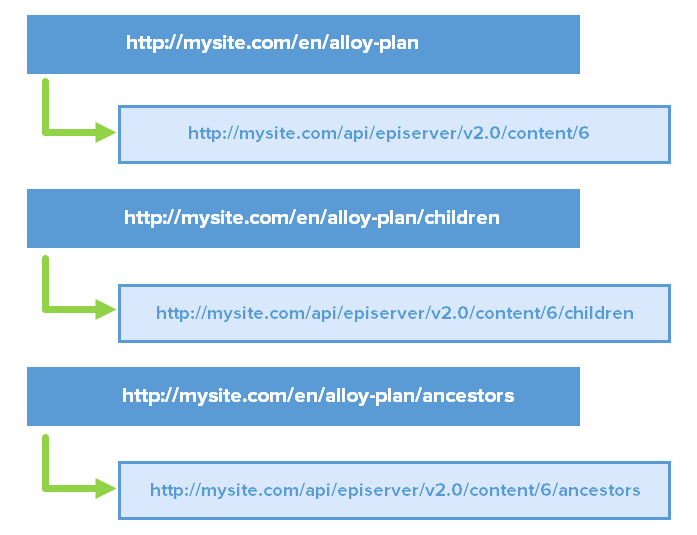Use friendly URLs
Describes how to use friendly URLs for data query in the Optimizely Content Delivery API.
In addition to using the regular endpoints, http://localhost:8080/api/episerver/v3.0/content/6, you can use a friendly name URL of a specific content item for data query: http://localhost:8080/en/alloy-plan/.
To use a friendly name URL to retrieve data, set the Accept HTTP header to application/json in your request. You also need to enable this feature with:
services
.AddContentDeliveryApi()
.WithFriendlyUrl();You can apply this rule for acquiring “children” and “ancestors” of the content item. You can use http://localhost:8080/en/alloy-plan/children or http://localhost:8080/en/alloy-plan/ancestors.
The parameters for the request (such as expand) should be the same as before.
The following image shows the flow.

Content Language
The language to get content is extracted from the URL. If it is empty, then the accept-language header is chosen.
Scenario:
- Request to
http://localhost:8080/enwith accept-language header sv. The URL's language en is present, so it is chosen. - Request to
http://localhost:8080/with accept-language header sv. The language is not present in the URL, so the language in the accept header is chosen, that is, sv in this case.
NoteIf the call to the Content Delivery API does not set the accept-language header (that is, the accept-language header is empty), as is the normal behavior of web browsers such as Chrome, it can automatically assign the value of the preferred language to accept-language (for example, en-US). The API then uses this value to query data.
Restrictions
-
A partial router is used for this feature, and the type for incoming and outgoing routing is
IContent.This can disrupt other partial routers in the site because the request URL is rewritten. To solve this problem:
- Create a class (for example,
CustomContentApiRouteService) that inheritsContentApiRouteServiceand then register a transient life-cycled implementation for aContentApiRouteServicein the initialization service. - Override the
ShouldRouteRequestfunction to prevent the URL from being re-written in unexpected cases. For example, requests whose accept types contain application/JSON are currently handled by the partial router. So, you can add one more header (such as Routed-By-ContentApi) for CD-related requests and then use this header in the function to decide whether the partial router should handle the request and rewrite URL later on.
- Create a class (for example,
Updated 4 months ago
